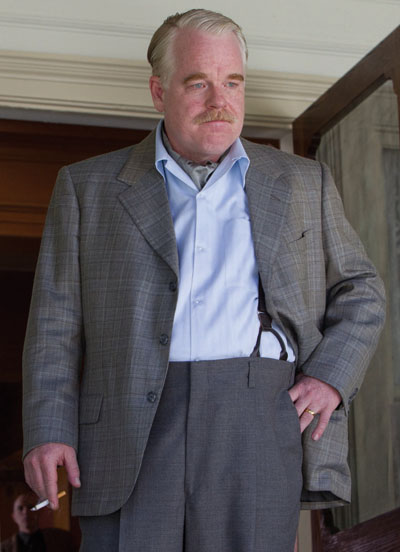Paul Thomas Anderson’s The Master is his first film since There Will Be Blood and although it stars Joaquin Phoenix and Philip Seymour Hoffman, who give two of the most blistering performances you will see for an unspecified time period — usually, the form is to say ‘this year’, but how do I know? I’m not psychic! — it is all so enigmatic and underwritten I felt rather shut out. A ‘challenging’ film is one thing, but one that actually slams the door in your face is quite another, as well as rude. Heck, I’m mother to a teenager and can stay at home if I want to be shut out and have doors slammed in my face. It’s a pity, though. Generally, I’m a fan of Mr Anderson, and his disturbing studies of souls in extremis, but this is a disappointment. I expect I’ll get over it, in time, but if you wish to send flowers and a card, then by all means please feel free to do so.
This is set in America, post-second world war, a time when people were reaching out for meaning and substance in their lives. (I read that in the bumf; I wasn’t there. And I’m not a time-traveller!) Phoenix plays Freddie Quell, a former Navy man who is a troubled loner and the sort of drunk who, when regular alcohol isn’t available, will knock back paint-thinner, photo-processing chemicals, meths, whatever he can lay his hands on. What Shall We Do with the Drunken Sailor? could have been an alternative title, but was I asked? No. Again. (Who do you have to sleep with round here if you want to title movies?)
Freddie tries paid employment as a portrait photographer in a department store, and picking cabbages, but both stints end badly in booze-fuelled violence and the sack. He drifts until, one night, he boards a yacht moored in San Francisco harbour and encounters Lancaster Dodd (Hoffman), a man who describes himself as ‘commander of this vessel’, as well as ‘a writer, doctor, nuclear physicist and theoretical philosopher’. He is also The Master, leader of a cult called The Cause, which, transparently, nibbles at the heels of The Church of Scientology just as Dodd nibbles at the heels of L. Ron Hubbard. (Warning: this film contains heel-nibbling.)
The Cause welcomes Freddie with open arms, but this isn’t a film which then debunks such cults and their sinister ways and all they stand for. It’s more the mental tug of war between Quell and Dodd and, to a lesser extent, Dodd’s spookily calm wife, Peggy (Amy Adams). This is a beautiful film, visually, with some spell-binding scenes, including Dodd singing a naughty folk song at a Cause gathering as Quell’s imagination undresses all the women, literally. And both Phoenix and Hoffman act their little socks off. Phoenix, hunched and fearful, projects great yearning, that we feel, even though we never quite know what exactly he is yearning for. And he wears his clothes as a shrunken thing within them. Hoffman, meanwhile, is so impressively charismatic that whether he actually believes all the guff he comes out with — our spirits, apparently, go back trillions of years — doesn’t especially matter. But the problem is this: what connects the two? This, I didn’t get at all.
Why does Dodd keep Freddie close, when he causes such trouble wherever they go? Why does Freddie stick with Dodd, who cannot ease that yearning? And there are other questions: what does The Cause believe in exactly and why aren’t we told? What are the restrictions on daily life? What is Dodd’s back story? This is a film that fails to communicate what it wanted to say, even if it had something to say in the first place. I like to think I don’t need all my narratives neatly wrapped with a bow on top but, by the end, this felt like a film so in love with itself it had forgotten the audience entirely. Although this is probably better than most films out there, and does have blistering performances of the kind you won’t see again for an unspecified time period, what shall we do with the drunken sailor? No idea. What was that motorbike scene all about? No idea. So, a disappointment, and you may send me flowers and a card if you so choose.






Comments